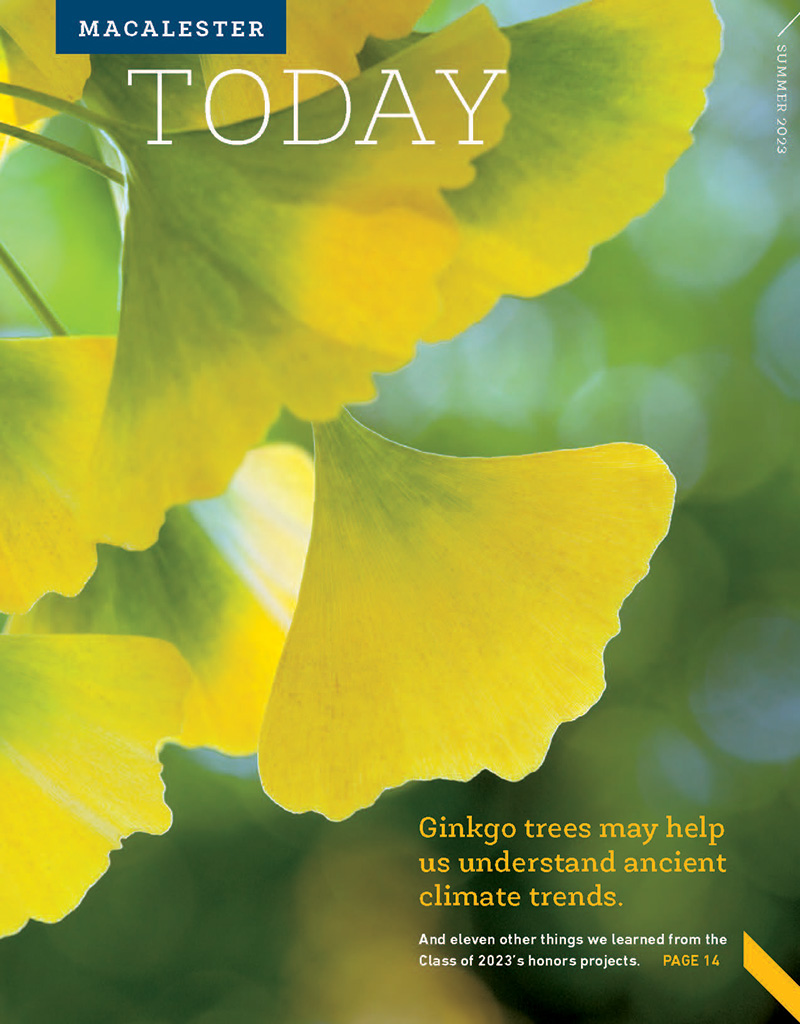
By Julie Hessler ’85 / Photo by Erich Saide
Even though biologist Benjamin Freeman ’06 has studied birds for years, they still enchant him. “Just yesterday, I was watching these murmurations of dunlin—20,000 living creatures moving across the sky as one in this shimmering, kaleidoscopic way,” he says. A murmuration is a strikingly poetic word for a large group of birds moving in unison—in this case, the shorebirds that winter near his home in Vancouver, British Columbia.
One bird, he says, had a fishing line with a float attached to its leg that trailed behind as it moved. “You realize these are individuals that are navigating an earth that is dominated by a single species—which is us.”
Freeman studies how birds—specifically those in the tropical mountains of South America—are responding to climate change. His work is powered by larger questions about how biological systems adapt to the pressures humans put on the earth. Last summer, his research made the cover of Science magazine. Birds, he argues, have a whole lot to tell humans about climate change and the planet. “A world in which we’ve done right by birds is a world in which humans can flourish,” he says.
Freeman was a nature-oriented child who often asked his mom to read him a field guide to lizards for a bedtime story. But birds around his Seattle home captured his attention the most. “I think it’s because birds use the same senses that humans do to make sense of our world,” he says. “We understand the way they experience the world a little bit better than the way, say, insects experience the world. And birds are dynamic. There is always something new to see.”
When Freeman enrolled at Macalester, classes with and mentorship from biology professors Mark Davis and Jerald Dosch bolstered his interest. Freeman was inspired by Dosch’s ornithology course, and he took every class offered by Davis. During a summer research project in Alaska with lab instructor Mike Anderson, Freeman studied bacteria in the roots of alder trees, learning about fieldwork in the long, light-filled days.
When Freeman was a junior, he took a semester off to work on a project in Bolivia led by a University of Florida researcher. He researched birds that migrate within South America, an experience he calls transformational. “South America is the bird continent,” he says. “It’s home to more species than any other place. Within a couple hundred meters of where I was, there were more species of birds than live in the entirety of Minnesota. I learned how to do field biology, and that was very exciting to me.”
After graduating from Macalester with a biology degree, Freeman worked as a birding guide in Colombia. He later earned a PhD in ecology and evolutionary biology at Cornell University, and he just completed a postdoctoral fellowship at the University of British Columbia. The tropical Andes, which include Bolivia, Colombia, Ecuador, Peru, and Venezuela, remain his central research focus.
Freeman wants to know how birds are changing where they live as human-caused climate change transforms the landscape. As we’re making things warmer, he asks, how do species respond? Freeman found that in the tropics, as it gets warmer, species that live on mountains are moving higher and higher up the mountain slope. “It’s like they are riding an escalator up the slope over time, over generations,” he says. “The species that live at the top of the mountain have nowhere higher to move to. For them, it’s an escalator to extinction.”
Freeman’s study of mountaintop birds in Peru showed that birds common in 1985, when Freeman was one year old, had disappeared in his lifetime. In other words, his research shows that climate change is not a problem for future generations—it is already affecting tropical species.
A second important area of Freeman’s research appeared on the cover of the July 22, 2022, issue of Science magazine. For centuries, Freeman says, people have known that birds on tropical mountains tend to live in narrow slices of the mountainside. The question is, why?
Freeman and his co-authors offer an answer. They found that competition and not climate change explains why tropical montane birds live in those narrow slices. Freeman thinks it means that climate change indirectly matters to the birds—for example, by altering food sources or transmitting avian diseases—not because warmer temperatures directly cause physiological stress.
Freeman says his future research will investigate how warming temperatures change species interactions and change where species live.
To do so, Freeman will rely in part on the community. He is wildly enthusiastic about eBird, an online database of bird observations. His team used more than 4.4 million eBird citizen science records from global observers for the research published in Science. Anyone who is interested can participate in eBird and add their own data, or simply use it for identifying birds in their neighborhoods. Freeman says eBird has provided valuable insights into bird habitat, migration, and responses to urbanization and land-use changes.
This summer, Freeman will move to Atlanta to take a faculty position at Georgia Tech. And while he may no longer have opportunities to watch murmurations of dunlin, he will be observing and listening closely to the birds in his new region. He urges everyone to do the same.
“We should pay attention to the natural world,” he says. “I think that starts with having some connection to it. I’ll advocate that birds are an excellent vehicle for that connection because they are so unarguably cool, but if birds don’t float your boat, find something else.”
Julie Hessler ’85 is the managing editor of Macalester Today.
July 18 2023
Back to top





